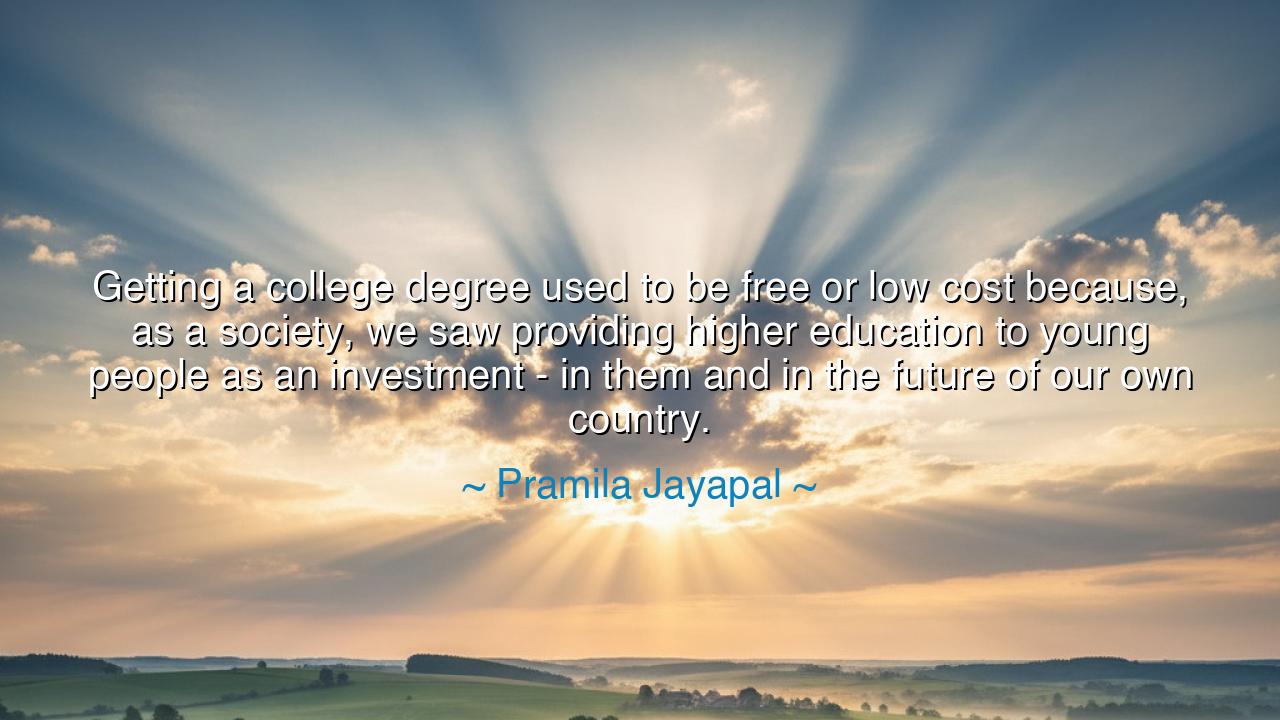
Getting a college degree used to be free or low cost because, as
Getting a college degree used to be free or low cost because, as a society, we saw providing higher education to young people as an investment - in them and in the future of our own country.






Hear the words of Pramila Jayapal, spoken with sorrow and with hope: “Getting a college degree used to be free or low cost because, as a society, we saw providing higher education to young people as an investment—in them and in the future of our own country.” In these words lies both remembrance and lament, a reminder of a time when knowledge was regarded as the seed of prosperity, and when the nurturing of young minds was seen as the noblest form of service to the nation. For education, when viewed rightly, is not a burden of cost but a fountain of renewal.
The ancients, too, recognized this truth. In Athens, education was not hoarded for the wealthy alone but was a civic duty, for the city believed that an informed citizen was the lifeblood of democracy. To train the youth was to safeguard the future of the polis. Rome built schools to prepare its leaders, not merely for their own advancement but for the strength of the Republic. So Jayapal reminds us that a country prospers not by gold alone, but by investing in the wisdom of its people.
History gives us a sharp example. After the Second World War, the United States passed the G.I. Bill, granting returning soldiers access to higher education. Millions of veterans studied at universities and technical schools, and from their learning arose engineers, teachers, scientists, and entrepreneurs. This investment did not weaken the nation—it transformed it, fueling decades of innovation and economic growth. The seed of knowledge planted then bore fruit for generations. Such is the power of treating education not as a luxury but as an investment.
But in the years that followed, this vision dimmed. The cost of a college degree rose higher and higher, until what was once a path of opportunity became for many a chain of debt. Where once education was seen as a gift to the future, now it is too often treated as a commodity to be purchased. The result is that countless young people begin their lives not with freedom, but with bondage. Jayapal’s words cry out against this betrayal of vision, urging a return to the older wisdom.
The truth she speaks is not only economic but moral. For when a society invests in its youth, it proclaims that every life has worth, that every mind has potential, and that the future belongs not only to the privileged but to all. To neglect this duty is to declare that some are worthy of flourishing and others are not, and such division weakens the very soul of a nation. A chain placed upon the student is a chain upon the country itself.
The lesson for us, O listener, is clear: we must see education not as a personal possession but as a shared inheritance. Support schools, vote for policies that make higher learning accessible, mentor the young, and remember that the knowledge you pass on is not lost, but multiplied. When we invest in the minds of youth, we invest in the resilience, the prosperity, and the greatness of all.
Thus, let Pramila Jayapal’s words endure as a guiding flame: to build a just and enduring future, we must restore the vision of higher education as an investment, not a privilege. A nation that plants knowledge in its youth secures its strength for generations. A nation that denies it weakens itself at the root. Therefore, choose to nourish the minds of the young, and in them you will see the flourishing of your country, brighter and stronger than before.






AAdministratorAdministrator
Welcome, honored guests. Please leave a comment, we will respond soon